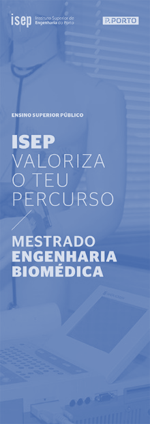 Células, Células estaminais, tecidos e órgãos: da Biologia da Regeneração à Medicina Regenerativa
Células, Células estaminais, tecidos e órgãos: da Biologia da Regeneração à Medicina Regenerativa Resumo
Our research program is directed to the identification of regulatory signals/pathways responsible for the regeneration/repair of the heart (a poorly regenerative/repair working model) and of the hematopoietic system (a highly regenerative stem cell-based system). An overview of the efforts we have been developing to establish robust and reproducible in vitro conditions for generation/expansion of both, cardiac precursors/cardiomyocytes and hematopoietic stem/progenitor cells (HSC/HPC) to a number and quality requested by clinical needs will be presented.
Perpetua Pinto-do-Ó![]()
Perpetua Pinto-do-Ó is a senior Investigator at the & I3S (Instituto de Investigação e Inovação em Saúde) & INEB (Instituto de Engenharia Biomédica), Universidade do Porto), where she leads a research group focused on Stem Cells and Regenerative Biology. Perpetua differentiated background makes her a multifaceted scientist, enabling her to explore both basic and applied science from a multitude of perspectives. Shortly, after completing a degree in Biology and a three years’ research period in Pharmacology (Faculty of Medicine, Porto University/Department for Molecular Medicine, Karolinska Institute, Stockholm), Perpetua enrolled in the Gulbenkian PhD Program in Biology and Medicine (IGC, Oeiras, Portugal) in 1995. This was her opportunity to get in touch with Developmental Biology and Stem Cells, an area that she pursed and in which got a PhD degree from Umeå University, Sweden (1996-2002). Importantly, during this period, Perpetua was involved in the development of two cell lines, one derived from embryonic stem (ES) cells (A.K.A. HPC-7) and the other from adult bone marrow stem/progenitor cells (A.K.A. HPC-5), which proved as an in vitro immortalized source of a high-fidelity proxy for mouse and human hematopoietic stem/progenitor cells. These lines were henceforth used by several laboratories worldwide remaining up-today as a reference in the field accounting so far over 140 citations. Afterwards, she undertook a postdoctoral training at Instituto de Biologia Molecular e Celular-IBMC (2003-2006), which allowed her to develop further skills in molecular immunology. By the end of 2007, she became a researcher at INEB, where she launched a Stem Cell and Regenerative Biology research line.
Along with her long-time interest on basic stem cell biology mechanisms, Perpetua got interested on understanding the role stem/progenitor cells allocated to specific tissue/organs might have on the regeneration in the adult organism. Therefore, and as a counterpart to her experience with the highly regenerative hematopoietic system, her team at INEB initially focused on the heart (a poorly regenerative/repair system) as a model in this investigation. As a result, a series of in vivo and in vitro tools were explored, implemented and newly-created thereby allowing the establishment of a new research program on Cardiovascular Biology and Repair at the Institute. Currently, and following the recent resuming of the investigation on hematopoiesis, her lab is equipped with a highly regenerative and a poorly regenerative/repair working models. Perpétua aims to establish a robust framework for comparative analysis studies across organ-systems focused on “the whether and how” stem/progenitor cells keep the homeostasis and functional restoration of distinct organ-systems.
Besides her activities as a researcher, Perpetua is currently the President of the Portuguese Society for Stem Cells and Cell Therapy (SPCE-TC) (http://spce-tc.org/) Moreover, she has been a lecturer on Stem Cells in Regenerative Therapies (2010-2014) at the Faculty of Engineering of the University of Porto (FEUP), and she is an Adjunct Professor at Instituto de Ciências Biomédicas Abel Salazar (ICBAS) of the University of Porto (2012-), where she is the the coordinator of the "Stem Cell Biology" course.
P. Pinto-do-Ó Scientific identifiers: Scopus Author ID 6507474925; http://orcid.org/0000-0002-6477-6030. https://www.researchgate.net/profile/Perpetua_Pinto-do-O




